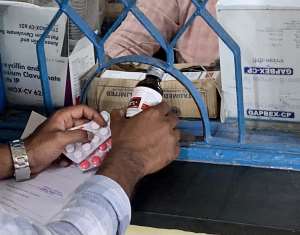
Protect the medicines that protect us and ensure that all those who need them can access them, so said Dr Tedros Adhanom Ghebreyesus, the Director General of The World Health Organization (WHO), at the Strategic Roundtable on "Charting a new path forward for global action against antimicrobial resistance (AMR)" held recently during the 77th World Health Assembly (decision-making body of the WHO which is attended by all countries part of the UN health agency WHO).
He reiterated WHO’s commitment to supporting countries to implement the resolution approved by this year’s World Health Assembly on how to accelerate national and global responses to AMR based on a One Health approach.
The roundtable deliberations overwhelmingly supported the creation of an "independent panel to monitor and report on the science and the evidence to facilitate collaborative and coordinated action against AMR," as proposed by Mia Amor Mottley, Prime Minister of Barbados, who is also the Chair of Global Leaders Group on AMR. Referring to data from the recent economic study commissioned by the Global Leaders Group on AMR, she cautioned that without a stronger response AMR will not only result in average loss of life expectancy of 2 years globally by 2035, but also cost the world an additional USD 855 billion annually in extra healthcare costs and lost productivity.
A report developed by Global Leaders Group on AMR to inform the outcomes of this year’s United Nations General Assembly High Level Meeting on AMR (to be held in September 2024), has proposed, amongst other recommendations, specific global targets to reduce deaths caused by bacterial AMR; promote antibiotic stewardship and responsible use in humans; and reduce antimicrobial use in the agri-food system.
Whole of society approach in responding to AMR
Mottley’s call to governments "to take a whole of society approach in their response to AMR and focus on prevention across all sectors- clean drinking water, safe and effective sanitation, food security, infection prevention and control in all settings (including healthcare facilities), and also safeguard against environmental contamination by antimicrobials" was also echoed by the roundtable discussants.
The new series by The Lancet on AMR has put forward the 10-20-30 global targets for sustainable access to effective antibiotics: a 10% reduction in mortality from AMR (by reducing both antibiotic use and resistance and enabling their great access); a 20% reduction in inappropriate human antibiotic use (against the backdrop of universal access to WHO’s access antibiotics); and a 30% reduction in inappropriate antibiotic use in animals by 2030.
Dr Ramanan Laxminarayan, President of One Health Trust, rues that lack of sustainable access to effective antibiotics kills more people than AMR does. More people are dying from bacterial infections than from TB, HIV/AIDS and malaria combined.
Dr Jean Kaseya, Director General of Africa CDC, corroborates these concerns. He laments that "people in Africa are dying mostly due to lack of effective antibiotics". In Africa, that saw over 1 million AMR associated deaths in 2022, the AMR crisis is mostly driven by fake medicines, coupled with irrational use of antibiotics, poor food security, lack of safe water, sanitation and hygiene. Dr Kaseya calls for accelerating the agenda of local manufacturing in Africa to enable all Africans to have access to quality and affordable antibiotics when they need it.
Are we seeing the humans behind the statistics?
Yes, AMR is directly responsible for 1.3 million deaths and contributes to 5 million deaths every year. But behind every number lies a real, human face. Antimicrobial resistance is invisible, but its survivors/ victims are not. It can affect anyone, anywhere. A minor injury, some routine surgery, or a common infection could unexpectedly blow up into a life-threatening situation. Sharing their lived experiences and consequences of AMR, survivors can go a long way in not only increasing the understanding of this overly medicalized issue in the public, it will also spur global action against AMR.
One such heart wrenching personal battle with AMR was shared at the roundtable by Vanessa Carter, Chair, WHO Taskforce of AMR Survivors. A near fatal accident, two decades ago, saw Vanessa moving in and out of hospitals for several years. She lost ten valuable years of her life between 25-35 years of age, undergoing multiple reconstructive surgeries, that included four facial prosthetic implants. Vanessa was eventually diagnosed with highly antibiotic resistant form of MRSA (Methicillin-resistant staphylococcus aureus) infection.
"For the first time in my life I learnt about antibiotic resistance. This flesh eating bacteria had damaged the left side of my face. I could hardly keep my artificial eye and had to cover my face- it looked so scary. It was very difficult to even look at my face in the mirror, watching this infection eating the skin away."
It came as a big surprise to Vanessa as to why antibiotic resistance was not a common knowledge, even though it is such a widespread global threat. She has since been raising awareness on AMR and advocating for improving responses to combat it.
Dr Ramanan calls AMR an 'optional' crisis - a problem that can be solved. Intersectional coordination with top-4 global agencies on human health, animal health, food and agriculture and the environment (WHO, World Organisation for Animal Health - WOAH, Food and Agriculture Organization of the United Nations - FAO, and United Nations Environment Programme - UNEP) for tackling AMR has also set the stage for One Health which is a simple and ancient recognition that our health is inextricably intertwined with the health of animals, plants and the planet.
"There is an urgent need to have more accountable, effective and functional multi sectoral governance systems in place to coordinate the local, regional and global responses to AMR and to also successfully implement targeted interventions," remarked Dr Abdullah Algwizani, CEO Public Health Authority, Kingdom of Saudi Arabia.
Professor Dame Sally Davies, Special Envoy on AMR for UK, hopes that "the high level meeting on AMR would truly address the needs of the most vulnerable communities, offering clear support to low and middle-income countries who carry the greatest burden of this antibiotic emergency. Fair and equitable access to antibiotics and diagnostics should be a high priority. Better access to essential antibiotics, embedded in a better system of WASH (water, sanitation and hygiene), IPC (infection and prevention control), vaccines, with responsible stewardship, and combined with an improved pipeline of new antibiotics diagnostics will save millions of lives”.
Call to move from Declaration to Implementation
And as Dr Peter Piot, Professor of Global Health, London School of Hygiene & Tropical Medicine (and its former Director as well as of UNAIDS), who chaired the roundtable, emphasises, "we will have to move from declaration to implementation that is grounded in science."
"We have plenty of tools but they will only materialise if there is leadership and if there is funding. There is also need for innovative mechanisms to guide basic research and lead it to actual products that are accessible to people," he said.
Indeed, political will, specific measurable targets, adequate funding, good governance and accountability are key to tackling this human made crisis.
Time is slipping by. Governments will have to move beyond rhetoric, and take urgent and concrete steps on the ground to safeguard the lives and health of people, animals, economies and our environment.
Shobha Shukla – CNS (Citizen News Service)
(Shobha Shukla is the award-winning founding Managing Editor and Executive Director of CNS (Citizen News Service) and is a feminist, health and development justice advocate. She is a former senior Physics faculty of prestigious Loreto Convent College and current Coordinator of Asia Pacific Regional Media Alliance for Health and Development (APCAT Media) and Global AMR Media Alliance (GAMA). Follow her on Twitter @shobha1shukla or read her writings here www.bit.ly/ShobhaShukla)




 You're an illiterate, illogical; a sane person won't praise Bawumia's 'destructi...
You're an illiterate, illogical; a sane person won't praise Bawumia's 'destructi...
 NHIS was a brainchild of NDC, piloted during PNDC era; we've failed to market th...
NHIS was a brainchild of NDC, piloted during PNDC era; we've failed to market th...
 'Mahama has no respect for Ghanaians; I'm disappointed in him' — Development Eco...
'Mahama has no respect for Ghanaians; I'm disappointed in him' — Development Eco...
 King Oyanka petitions IGP: Greater Accra Regional Police accused of undermining ...
King Oyanka petitions IGP: Greater Accra Regional Police accused of undermining ...
 'It's backed by data' — Local gov't Minister clarifies his 'Ghana's poverty leve...
'It's backed by data' — Local gov't Minister clarifies his 'Ghana's poverty leve...
 TUC condemns manager for assaulting female employee at Nkawkaw over GHC90
TUC condemns manager for assaulting female employee at Nkawkaw over GHC90
 SSNIT Hotels Sale: We will continue to engage stakeholders — Director-General
SSNIT Hotels Sale: We will continue to engage stakeholders — Director-General
 Claims gov't secured debt restructuring agreement with IPPs misleading, deceptiv...
Claims gov't secured debt restructuring agreement with IPPs misleading, deceptiv...
 Koforidua SECTECH Staff dies in car crash at Somanya
Koforidua SECTECH Staff dies in car crash at Somanya
 NDC National Executive fume over suspension of ‘sexy’ Assin Central PC
NDC National Executive fume over suspension of ‘sexy’ Assin Central PC
